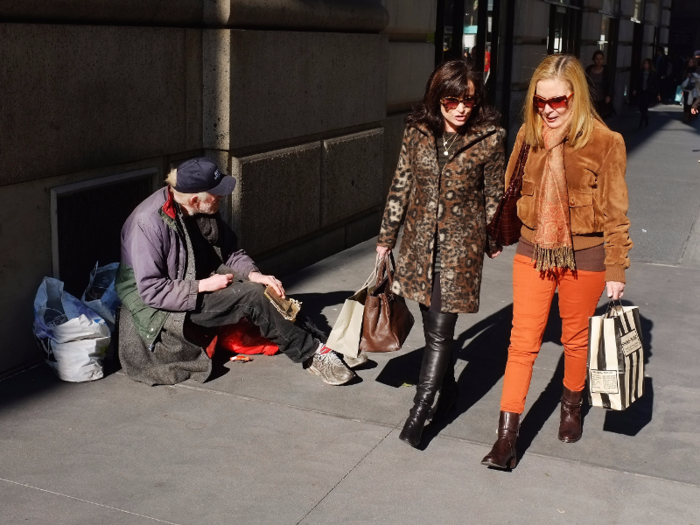What power does to your brain and your body
Being powerful can dampen your ability to empathize with others.

Powerful people are less able to mirror people they observe or interact with.

Powerful people's "mirroring" systems are not as strong as those of others. That means they're less likely to mimic a person they're having a conversation with, and they'll do less laughing or shrugging along with their companion.
A 2014 study looked at brains of “high-power” people and revealed that when observing others squeeze a ball, they had less resonance in certain brain areas that should typically light up, suggesting their brains had become less empathetic and able to ‘mirror’ others. The more power someone had, the less resonant they were.
Leaders can find it tough to muster up compassion.

The vagus nerve, which runs from the top of the spinal cord down to the abdomen, has been shown to promote compassion, gratitude and appreciation.
But Keltner's work has shown that this nerve bundle gets "de-activated" in powerful people. He says that could partially explain why "it's harder to know how people feel when you're feeling powerful."
Some research has shown that being powerful makes people more likely to break the rules, and less likely to share.

A 2011 study showed that people driving high-end cars were four times more likely to cut off other drivers, and three times more likely to cut off a pedestrian about to cross the street. (Some say this could just be a sign that the rich and powerful are more willing to take risks.)
The same researchers also observed how people acted when told that a bin of candy nearby was going to be given to kids. Upper-class people were more likely to be greedy and take extra candy from the bin.
Counterintuitively, greater income inequality leads powerful people to be less generous.

Income inequality can make powerful people less generous and foster a sense of entitlement.
A study of over 2,000 Americans revealed that high-income people in more unequal states were less generous. High-income people living in conditions of low inequality, however, showed about the same level of generosity as lower-income people.
That suggests rich people may not necessarily be inherently less generous, but they are likely to be less charitable if income distribution is more unfair.
Power can help buffer against stress.

For years, researchers have hypothesized that powerful people have a kind of built-in "stress buffer": they consistently demonstrate lower levels of the stress hormone cortisol, and higher testosterone, which helps reduce fear. This holds true across genders (though women have about one-sixth the amount of testosterone that men do).
This isn't just the case once people have attained power — having lower levels of cortisol and higher levels of testosterone can also predict whether someone rises into a position of leadership.
Pranjal Mehta, who studies hormones and power at University College London, told Business Insider that these common traits wind up propagating inequality. For example, a job candidate who comes from a wealthy or privileged background already has more sources of power, so they may walk into an interview with extra "psychological resources" that buffer them from stress.
Mehta explained that such a candidate might "appear more competent, regardless of their actual abilities."
The effects of power extend from the brain into the body.

Powerful people such as police officers have been shown to process blood in the heart faster and deliver that fresh, oxygenated blood to the brain quicker, according to research from Wendy Mendez, who studies how power impacts the body at the University of California - San Francisco.
In this way, powerful people can stay healthier and are less likely to develop deadly diseases.
Powerful people who make more money live longer, healthier, less stressful lives.

The richest Americans can expect to live more than six years longer than people living below the poverty line, because they have access to things like healthier food, better health care, and relatively pollution-free neighborhoods.
That's true for anyone making an income more than four times the federal poverty level. (That's a family of four living on over $98,400 a year, or a single person making more than $48,240.) A 2011 study showed that people making more than $100,000 a year also report lower levels of sadness, hopelessness, and worthlessness than their lower-income counterparts.
But the effects aren't just about money: Research has shown that a person's perception of their own socioeconomic status and where they fit in the social hierarchy also impacts their health. Data from the World Bank suggests that countries with higher income inequality have lower life expectancy rates at all income levels. Researchers say the wealth inequality leads to less "social cohesion" — and more fear and stress for everyone.
We may be primed to give strong-looking men more power.

Research from 2016 showed that men who are perceived as more "physically formidable" tend to be perceived as having greater leadership abilities.
But the effect isn't universal. Strong men who were seen as "aggressively self-interested" were not seen as any more worthy of leadership status.
Those who appear to be power-dressers can even have an effect on the heartbeats of the people around them.

A 2014 study by Wendy Mendez pitted power-dressers against those who looked more casual — some men wore black dress suits from Macy's, while others wore white t-shirts and plastic sandals from Walgreens.
Mendez found that "high-class" dressers had an impact on their counterparts' hearts: When the heartbeats of the men in suits started racing, their partners' did too. When the power-dressers heart rates slowed, the pulses of the sandal-wearers mirrored that as well.
But power doesn't always help your health.

When a person who's in power thinks they might lose their status, their cortisol levels can skyrocket. Mehta said this might play out in an election year.
"People in positions of power, their stress levels might be increasing," he said.
On the flip side, in power voids or times of uncertainty about leadership, people of lower status can feel like they've got a fairer shot at making it big.
There are some antidotes to power's corrupting influence, however.

Not all studies about power are bad news. Research has shown that people who focus on the needs of others and work to improve social welfare are better at understanding peoples' needs and desires, and improve their ability to manage and cooperate with colleagues.
When people feel a heightened sense of social responsibility in connection with their position of power, they're more in tune with the needs and views of others.
It's important for people in power to remember their roots ...

Pepsi CEO Indra Nooyi loves to tell the story of the day she became president of the board, and her mother sent her out to fetch milk.
She returned in a huff. Here's how she told the story to The Atlantic:
I banged [the milk] on the counter and I said, 'I had great news for you. I've just been told that I'm going to be president on the Board of Directors. And all that you want me to do is go out and get the milk, what kind of a mom are you?' And she said to me, 'let me explain something to you. You might be president of PepsiCo. You might be on the board of directors. But when you enter this house, you're the wife, you're the daughter, you're the daughter-in-law, you're the mother. You're all of that. Nobody else can take that place. So leave that damned crown in the garage. And don't bring it into the house.'
Social scientists say that ability to remember one's roots — the background and people that helped a person make it to the top — is an exercise in gratitude that can keep powerful people in touch with others.
... And keep listening

Leaders who remember that their power is only as good as the respect others have for them also have an easier time staying grounded.
Keltner said that in order to keep his own power in check, he channels his inner Abraham Lincoln, who was known for actively listening to everyone who spoke with him.
"That really is a quality of great leaders," Keltner said. "They stay fascinated by and devoted to other people."
Popular Right Now
Popular Keywords
Advertisement